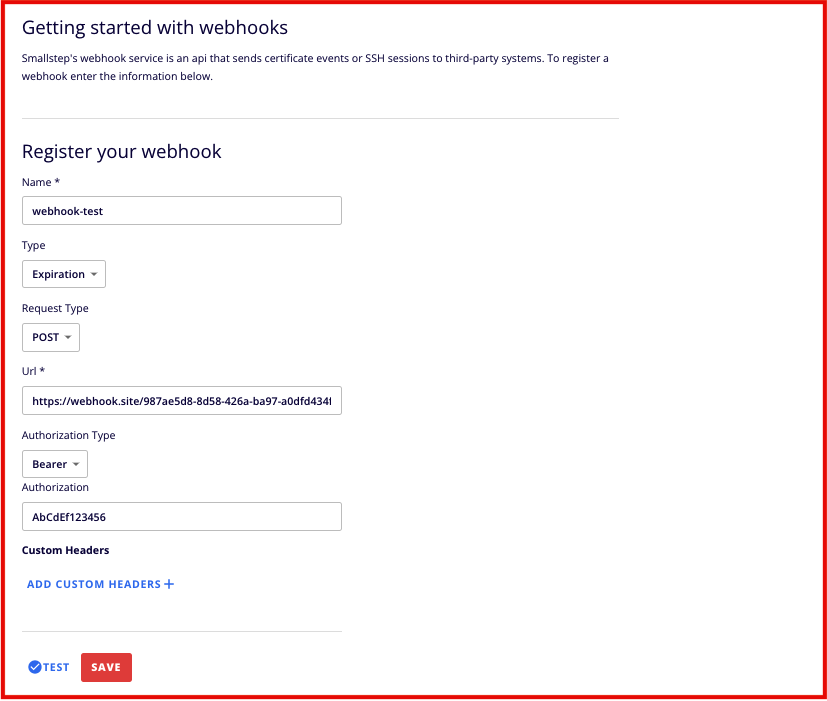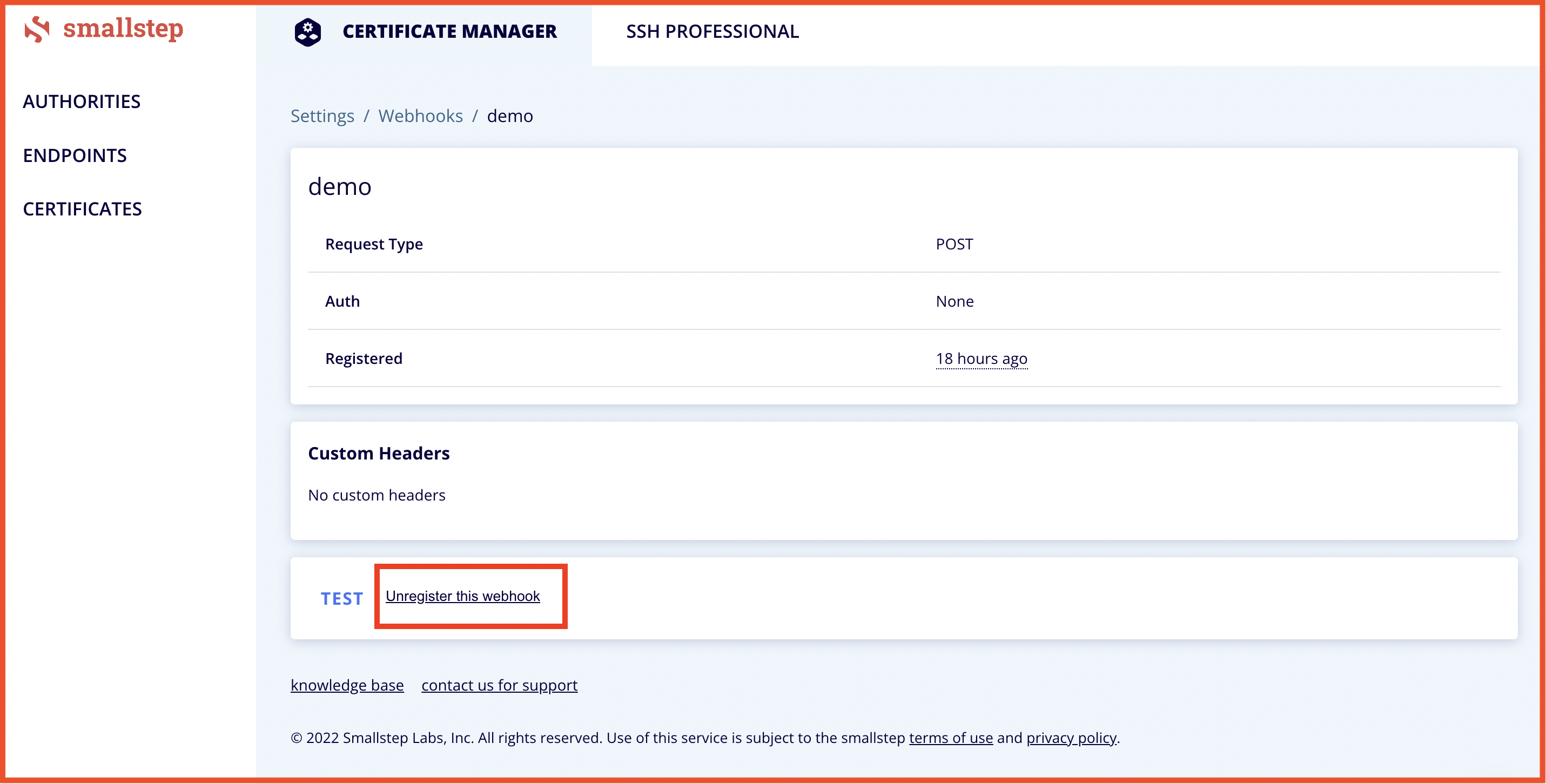Menu
Products
Open Source
- Configure popular ACME clients to use a private CA
- Use Kubernetes cert-manager with
step-ca - Issue X.509 host certificates to cloud VMs
- Issue X.509 user certificates via your identity provider
- Create a CA that uses RSA keys
- Import an existing root or intermediate CA into
step-ca - Use Keycloak to issue SSH certificates with step-ca
- Run an SSH CA and connect to VMs using SSH certificates
- Use AWS to deploy a certificate authority and secure microservices
- Run
step-cain a Docker container - Federate multiple autonomous certificate authorities
Products
Open Source
- Configure popular ACME clients to use a private CA
- Use Kubernetes cert-manager with
step-ca - Issue X.509 host certificates to cloud VMs
- Issue X.509 user certificates via your identity provider
- Create a CA that uses RSA keys
- Import an existing root or intermediate CA into
step-ca - Use Keycloak to issue SSH certificates with step-ca
- Run an SSH CA and connect to VMs using SSH certificates
- Use AWS to deploy a certificate authority and secure microservices
- Run
step-cain a Docker container - Federate multiple autonomous certificate authorities
Events
Events power alerting for certificate lifecycle activities. Used to help administrators operate the Smallstep Platform, Events can be generated and surfaced via standard mechanisms. Events are a feature of the commercial Smallstep Certificate Manager offering.
Webhook Events
Webhook Events allow for real-time logging of SSH sessions,
certificate creation, and certificate expirations events. You can use Webhook Events to:
- Alert on certificate expiry - Prevent certificate expiry related outages with proactive notifications on upcoming expirations.
- Stream events to monitoring solutions - Push detailed certificate information to third-party monitoring and alerting systems.
- Monitor certificate operations - Ensure your automated certificate toolchain is operating as expected.
Webhook Event Types
We currently have four webhook event types, namely:
SSH: Sends a webhook event for SSH start and stop sessions and user change events.
Expiration: Sends a webhook event for Certificate Manager when a certificate is within the last 25% of its lifetime, and again when it expires.
Certificate: Sends a webhook event for Certificate Manager with basic certificate details whenever a certificate is created or expires.
All: Sends events for everything above, for both SSH and Certificate Manager.
Note: We do not send certificate expiration events for OIDC certificates, to minimize noise, since they're usually short-lived. However, certificate creation events for such certificates will always be sent.
Using Webhook Events
To register a webhook, go to Settings > Webhooks and fill out the form as shown below:

Webhook Events Response Formats
Here are examples of the response data you should expect to receive for each webhook event type:
SSH 'session start' event
{
"category": "ssh-session",
"hostname": "example-host.example.com",
"username": "tester",
"id": "d0547bbd-aab6-4531-b809-868f60d0bda7",
"timestamp": "2022-08-01 20:29:23.333679027 +0000 UTC",
"type": "start"
}
SSH 'session end' event
{
"category": "ssh-session",
"hostname": "example-host.example.com",
"username": "tester",
"id": "d0547bbd-aab6-4531-b809-868f60d0bda7",
"timestamp": "2022-08-01 20:32:14.816883566 +0000 UTC",
"type": "end"
}
SSH 'user change' event
{
"category": "ssh-session",
"hostname": "example-host.example.com",
"username": "root",
"id": "d0547bbd-aab6-4531-b809-868f60d0bda7",
"timestamp": "2022-08-01 20:31:47.771260977 +0000 UTC",
"type": "user_change"
}
Where:
| Parameter | Description |
|---|---|
| category | The webhook event type. One of `ssh-session`, `certificate-request`, or `certificate-expiration`. |
| hostname | The name of the registered host |
| username | The posix username of the user responsible for the ssh session |
| id | The smallstep ssh session id |
| timestamp | The time at which the event occurred |
| type | The specific type of SSH event type |
Certificate creation event
{
"category": "certificate-request",
"authorityId": "5c780190-4e4e-4c5a-9331-50be29b28e21",
"serialNumber": "217736770851791642908500119529647273613",
"id": "4f2f0c29-704a-46f8-8f90-f7f74675b169",
"notBefore": "2022-08-01T20:36:51.000Z",
"notAfter": "2022-08-01T20:42:51.000Z",
"certificate": "-----BEGIN CERTIFICATE-----\nMIICITCCAcegAwIBAgIQOyXzxXEspOAfi/10+hPMLjAKBggqhkjOPQQDAjAhMR8w\nHQYDVQQDExZKV0sgU0EgSW50ZXJtZWRpYXRlIENBMB4XDTIyMDgwMTIwMzY1MVoX\nDTIyMDgwMTIwNDI1MVowFDESMBAGA1UEAxMJbXlzZXJ2aWNlMFkwEwYHKoZIzj0C\nAQYIKoZIzj0DAQcDQgAEfDkIN/DlpolcxVqMu5iZ0zJqVlAXfasCJvGxwBJKpQdS\nZJOLsenrguwJJpLqNuj3icIhI6gFodqvLpNAcaJ/zKOB7TCB6jAOBgNVHQ8BAf8E\nBAMCB4AwHQYDVR0lBBYwFAYIKwYBBQUHAwEGCCsGAQUFBwMCMB0GA1UdDgQWBBRM\nO8Ak/HRgQ9j8iIK4xgONh+/W8DAfBgNVHSMEGDAWgBSNeT/nLC3Z+iRpVXVdvgpH\nlJRzwjArBgNVHREEJDAigiBteXNlcnZpY2UuaW50ZXJuYWwubXljb21wYW55Lm5l\ndDBMBgwrBgEEAYKkZMYoQAEEPDA6AgECBA9hdXRob3JpdHktYWRtaW4EJGQzMTc0\nMjM2LTE1YzEtNDEzOC04OTJkLTVlZDIzNDcxN2M5YTAKBggqhkjOPQQDAgNIADBF\nAiEA5kXI0dB6xMnEMAiwEigy0vYMHXYvX97BderaMFGdmSECIH2FQ/5A7RyxdkbE\nNVOdaxxFAW8YBCiyiKxnu0BzOM+C\n-----END CERTIFICATE-----\n",
"subject": {
"commonName": "myservice",
"country": "",
"organization": "",
"organizationalUnit": "",
"locality": "",
"province": "",
"street": "",
"state": "",
"email": ""
},
"sans": [
{
"type": "DNS",
"value": "myservice.internal.mycompany.net"
}
]
}
Certificate expiring/expired event
{
"category": "certificate-expiration",
"authorityId": "5c780190-4e4e-4c5a-9331-50be29b28e21",
"serialNumber": "204736770851791642908500119529647273613",
"id": "4a0d055f-8ac2-463f-b090-0e940fadc0c3",
"notBefore": "2022-08-01T20:48:20.000Z",
"notAfter": "2022-08-01T20:54:20.000Z",
"certificate": "-----BEGIN CERTIFICATE-----\nMIICHzCCAcSgAwIBAgIRAJoG3iYtwd9xSbAsRjDMdo0wCgYIKoZIzj0EAwIwITEf\nMB0GA1UEAxMWSldLIFNBIEludGVybWVkaWF0ZSBDQTAeFw0yMjA4MDEyMDQ4MjBa\nFw0yMjA4MDEyMDU0MjBaMBQxEjAQBgNVBAMTCW15c2VydmljZTBZMBMGByqGSM49\nAgEGCCqGSM49AwEHA0IABNfWJtHDDXlvfiljmzzgNdzmmk5Xhxf84RiP9DShOXxI\nNgndPXYp7d49UCVKm3IrJ3HY/6WBh2g/cv0p2BQ3kUejgekwgeYwDgYDVR0PAQH/\nBAQDAgeAMB0GA1UdJQQWMBQGCCsGAQUFBwMBBggrBgEFBQcDAjAdBgNVHQ4EFgQU\nNgNvb8W9k/5/PHNQYx+xaQ45faQwHwYDVR0jBBgwFoAUjXk/5ywt2fokaVV1Xb4K\nR5SUc8IwKwYDVR0RBCQwIoIgbXlzZXJ2aWNlLmludGVybmFsLm15Y29tcGFueS5u\nZXQwSAYMKwYBBAGCpGTGKEABBDgwNgIBAQQEbmFtZQQrQ09pRDNLMzE1Mms3TW5Q\nNDR2eWlaLXNZaVphMmtSZU9fWFRNRG54RTB3VTAKBggqhkjOPQQDAgNJADBGAiEA\nuWabixlFwJif3+ypPdJax5xPwCPT+LxL2ETNP0RwGvICIQC/fdBn7b+W+sa9GSLx\nDFNysUCX39uO7F7XbAEJBRFa8A==\n-----END CERTIFICATE-----\n",
"subject": {
"commonName": "myservice",
"country": "",
"organization": "",
"organizationalUnit": "",
"locality": "",
"province": "",
"street": "",
"state": "",
"email": ""
},
"sans": [
{
"type": "DNS",
"value": "myservice.internal.mycompany.net"
}
]
}
Where:
| Parameter | Description |
|---|---|
| category | The specific webhook event type. |
| authorityId | The ID of the certificate authority responsible for the issuance of the created, about to expire, or already expired certificate. |
| serialNumber | The serial number of the certificate |
| id | The Smallstep UUID of the certificate |
| notBefore | The time before which the certificate is ineligible for use. |
| notAfter | The time after which the certificate will no longer be valid (i.e, expiration time) |
| certificate | The PEM encoded format of the certificate |
| subject | An object containing details of the entity that the certificate was issued for. |
| sans | An array of the details of the certificate's subject alternative names |
Deleting Webhook Events
If you no longer have need for a webhook and wish to delete it:
- Go to Settings > Webhooks
- Click on the webhook's name
- Click on Unregister this webhook as shown below:

Subscribe to updates
Unsubscribe anytime. See our privacy policy.
© 2023 Smallstep Labs, Inc. All rights reserved.